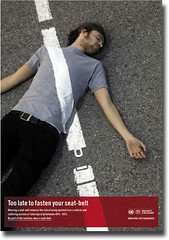More than 10,000 drivers have benefited from the Ford Eco-Driving programme which has been running since 2000 in Germany. 
Drivers who adopt the Ford Eco-Driving style will see an average fuel saving of 25 percent and thus, a similar reduction in CO2 emissions. For the average driver this can mean a yearly saving of approximately 300 euros and a saving of 500 kilos in emissions.
Among the techniques taught to participants in the Ford Eco-Driving programme are the following:
Drive in a smooth, relaxed style, at an even speed and leave sufficient distance between you and the car in front to minimise the need for sudden braking e.g. approximately three seconds distance – that’s about 40m at 50km/h.
Change lanes early – before encountering any obstacles; that will save you from braking unnecessarily or accelerating to get into the desired lane.
Belt up, switch on ignition and set out immediately: don’t warm up the engine.
Keep the revs down: with modern engines you should be able to keep between 1500-2500rpm. This also reduces noise –- one car at 4000rpm is equivalent to 32 cars at 2000rpm.
Guide to using gears:
From 30kmh – 3rd gear
From 40 kmh - 4th gear
From 50kmh - 5th gear
At a steady 50km, you use 17 percent more fuel in 4th than in 5th. Overall advice for gear changes: “move up the gears quickly, down the gears slowly”.
In stop-start traffic:avoid sudden acceleration and braking
release foot from accelerator early, move into neutral and let car roll forward to a stop
If you’re stopped for more than 20 seconds (e.g. loading, at a level crossing or in a traffic jam etc.) you can save energy by switching off the ignition: you use the same fuel stopped for three minutes with the engine running as you do travelling for one km at 50kmh.
Most cars are on underinflated tyres – this wastes fuel. Even 0.2 bar underinflation increases rolling resistance by up to 10 percent. Check your pressures regularly.
Use air conditioning only when needed and turn off heated windscreen and rear window as soon as they are clear
Make sure your car is serviced as prescribed
Avoid short journeys – they use most fuel and cause most wear on a car.
April 23, 2008
Take it easy, save fuel, money
Labels: economy, emissions, environment, ford




